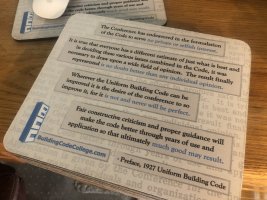CodeWarrior
REGISTERED
For those of you using the ICC Ecodes, you may have seen the ES symbol in the chapter heading. Clicking on it brings up a list of ES reports. Apparently, the manaufacturers pay ICC to add this to the codes. Another "pay to play" scheme.
I think this offering inputs bias within ICCES, as those who pay extra probably get favorable treatment in getting the reports out and an evaluation review that will not be as rigorous as a competitor who just wants to have their report out there. ICC is merchandizing certain reports over others, instead of equitably providing the evaluation reports and let the user or regulator decide from what is available?
If ICC is going to be in the merchandising game, they should open it up to other listing agencies like UL, CSA, IAPMO, Intertek, etc.
What will stop ICC from inserting after the section in IBC Chapter 17 about approved agency -- "we are an approved agency, trust us"?
This makes the ecodes available for advertisements, essentially. The pdfs and hard copies of the codes may end up with ads interspersed within the chapters.
Not sure if the other code writers have done this yet, like IAPMO and NFPA, and standards writers like ASTM and ANSI. Hopefully not.
I think this offering inputs bias within ICCES, as those who pay extra probably get favorable treatment in getting the reports out and an evaluation review that will not be as rigorous as a competitor who just wants to have their report out there. ICC is merchandizing certain reports over others, instead of equitably providing the evaluation reports and let the user or regulator decide from what is available?
If ICC is going to be in the merchandising game, they should open it up to other listing agencies like UL, CSA, IAPMO, Intertek, etc.
What will stop ICC from inserting after the section in IBC Chapter 17 about approved agency -- "we are an approved agency, trust us"?
This makes the ecodes available for advertisements, essentially. The pdfs and hard copies of the codes may end up with ads interspersed within the chapters.
Not sure if the other code writers have done this yet, like IAPMO and NFPA, and standards writers like ASTM and ANSI. Hopefully not.

